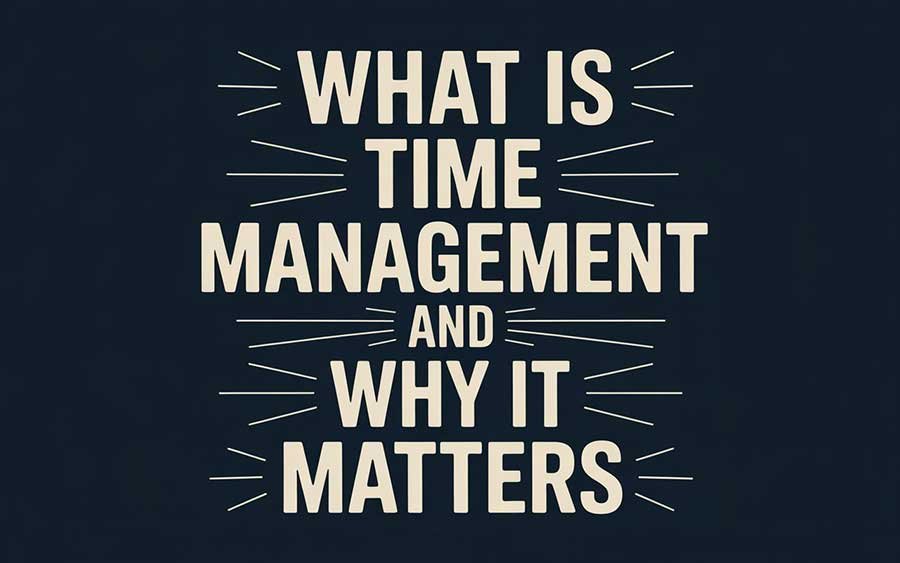
What Is Time Management and Why It Matters
Time — we all have the same 24 hours in a day, yet some people seem to accomplish so much while others constantly feel behind. The secret isn’t more time. It’s better time management.

Time management is more than just checking tasks off a list. It’s about living intentionally, making progress on what truly matters, and creating space for both productivity and peace. In this comprehensive guide, we’ll dive deep into what time management really means, why it’s crucial in every area of life, how real people use it to transform their days, and how you can master it step by step.
What Is Time Management?
Time management is the process of planning and organizing how you divide your time among specific activities to maximize effectiveness, efficiency, and balance. It involves setting goals, prioritizing tasks, managing distractions, and maintaining focus.
But more than productivity hacks and to-do lists, time management is about creating a life that aligns with your values and vision. It’s not about doing more — it’s about doing what matters most.
Why Time Management Matters
1. Reduces Stress and Overwhelm
When you manage your time well, you feel more in control. You stop rushing, stop procrastinating, and start finishing tasks with calm confidence.
2. Boosts Productivity
Effective time management helps you accomplish more in less time. This leaves room for rest, hobbies, and meaningful relationships.
3. Creates Work-Life Balance
By setting boundaries and managing priorities, you protect personal time and prevent burnout — especially in demanding jobs or roles like parenting.
4. Helps You Reach Long-Term Goals
Daily actions aligned with long-term goals turn dreams into results. Good time management bridges the gap between intention and accomplishment.
5. Improves Confidence and Clarity
When your day has direction, you feel capable and focused. You stop spinning your wheels and start moving forward.
Core Principles of Time Management
1. Prioritization
Not all tasks are created equal. Time management means identifying what’s most important (not just most urgent).
2. Planning
Successful people plan their days, weeks, and even years. Planning reduces decision fatigue and increases intention.
3. Boundaries
Time management requires saying no to distractions, low-priority requests, and energy-draining commitments.
4. Focus
Multitasking kills productivity. Time management helps you stay fully present on one task at a time.
5. Flexibility
Life happens. A good time manager knows how to pivot when needed without losing the big picture.
Real-Life Examples of Time Management Success
Amanda – The Overwhelmed Working Mom
Amanda used to wake up already behind. Her mornings were chaotic, her afternoons reactive, and her evenings a blur. Then she started using time blocks. From 6–8 a.m. was her “family time,” 9–12 was “deep work,” 12–1 was lunch and reset, and so on. She started finishing work by 5 p.m., having time for her kids, and even building a side hustle on weekends.
Kevin – The College Student Who Raised His GPA
Kevin’s grades were slipping. He realized he spent most of his time reacting — to group texts, emails, and late-night cram sessions. He started using a weekly planner, batching his study time, and turning his phone on “Do Not Disturb” during study blocks. His GPA improved dramatically within one semester.
Rachel – The Entrepreneur Who Avoided Burnout
Rachel was running a fast-growing business but working 70+ hours a week. She implemented the Eisenhower Matrix to prioritize her tasks by urgency and importance. She hired help, blocked out personal time, and started ending her workday by 6 p.m. Her creativity returned, her energy increased, and her revenue kept growing.
How to Start Managing Your Time Effectively
Step 1: Set Clear Goals
Define what matters most. Use the SMART goal framework:
- Specific
- Measurable
- Achievable
- Relevant
- Time-bound
Step 2: Choose a Planning System That Works for You
Try one of these systems:
- Paper planners
- Digital calendars (Google Calendar, Outlook)
- Time blocking
- Bullet journaling
- Daily to-do lists with priority levels
Step 3: Prioritize Using the Eisenhower Matrix
- Urgent and Important: Do it now
- Important but Not Urgent: Schedule it
- Urgent but Not Important: Delegate it
- Not Urgent or Important: Eliminate it
Step 4: Batch Similar Tasks
Answer emails in one time block. Run errands together. Grouping similar tasks saves energy and reduces context switching.
Step 5: Limit Distractions
- Turn off notifications
- Use focus apps like Forest, Freedom, or Pomodoro timers
- Create a distraction-free workspace
Step 6: Leave Buffer Time
Leave 15–30 minute gaps between major tasks. Life rarely follows a perfect schedule.
Step 7: Review and Reflect Weekly
- What worked?
- What drained you?
- What can be improved?
Reflection helps you adjust and improve your system over time.
Time Management Tips for Different Life Roles
For Parents:
- Use shared calendars for school events
- Prep meals and clothes the night before
- Block “quiet time” to recharge during naps or after bedtime
For Students:
- Review the syllabus and pre-schedule study sessions
- Color-code by subject
- Use the 25/5 rule (25 minutes of study, 5-minute break)
For Entrepreneurs:
- Define working hours and stick to them
- Use project management tools like Trello or Asana
- Batch content creation
For Full-Time Workers:
- Plan your next day before logging off
- Avoid meetings that could’ve been emails
- Use your commute for audiobooks or personal development
20 Inspirational Quotes About Time Management
- “Don’t count every hour in the day. Make every hour in the day count.” – Unknown
- “Time is what we want most, but what we use worst.” – William Penn
- “Lost time is never found again.” – Benjamin Franklin
- “The bad news is time flies. The good news is you’re the pilot.” – Michael Altshuler
- “Time is more valuable than money. You can get more money, but you cannot get more time.” – Jim Rohn
- “Either you run the day, or the day runs you.” – Jim Rohn
- “A man who dares to waste one hour of time has not discovered the value of life.” – Charles Darwin
- “You will never find time for anything. If you want time, you must make it.” – Charles Buxton
- “Lack of direction, not lack of time, is the problem. We all have twenty-four hour days.” – Zig Ziglar
- “Time stays long enough for those who use it.” – Leonardo da Vinci
- “Your future is created by what you do today, not tomorrow.” – Robert Kiyosaki
- “Success is not in doing more, but in doing what matters most.” – Unknown
- “Ordinary people think merely of spending time. Great people think of using it.” – Arthur Schopenhauer
- “One today is worth two tomorrows.” – Benjamin Franklin
- “He who every morning plans the transactions of the day and follows out that plan carries a thread that will guide him through life.” – Victor Hugo
- “Focus on being productive instead of busy.” – Tim Ferriss
- “Time slips away like grains of sand never to return again.” – Robin Sharma
- “You cannot overestimate the unimportance of practically everything.” – Greg McKeown
- “Discipline is choosing between what you want now and what you want most.” – Abraham Lincoln
- “Time management is life management.” – Robin Sharma
Picture This
Picture this: You wake up with a sense of calm. Your day is mapped out. You’re not reacting — you’re leading. Tasks get done without chaos. You have time for lunch, a walk, your goals, and your people. You go to bed with peace instead of pressure.
Now imagine that every day. A life not ruled by deadlines or guilt, but one led with purpose and clarity. That’s what mastering time management can do.
What would your life look like if your time worked for you — not against you?
Please Share This Article
If this article helped you see time management in a new light, please share it with someone else who could use more time, clarity, and peace in their life. You never know who might be one planning session away from a breakthrough.
Disclaimer
This article is for informational purposes only and reflects personal experience, anecdotal examples, and general productivity strategies. It is not intended to replace professional advice. For personalized time management coaching or productivity solutions, consult a qualified professional.






